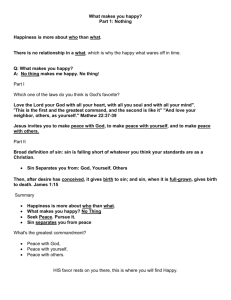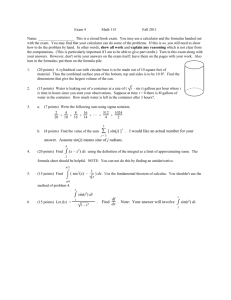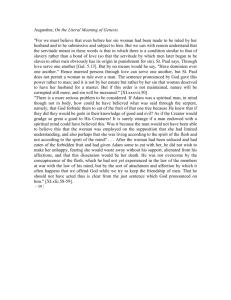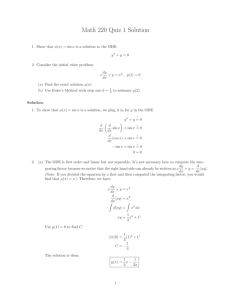may
advertisement
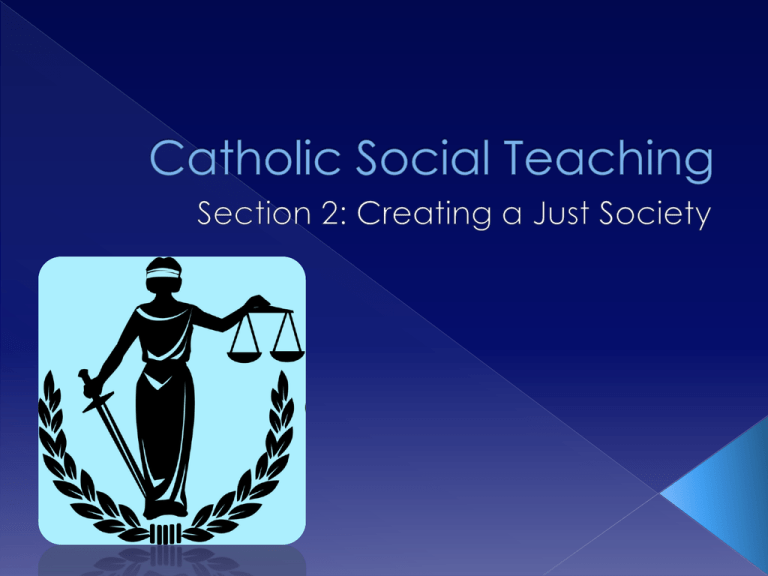
Hunger, poverty, and homelessness are realities that God never intended to exist in our world since, for the most part, they are a result of human sin. Human sins, over time, such as unjust distribution of goods, become societal structures without people even knowing it. Christ calls us to alleviate the immediate needs of people, as well as to correct the sinful social structures that cause people suffering and injustice. Sin is any deliberate offense in word, deed, or desire, against the will of God. Sin injures human nature and human solidarity. Sin is also an offense against the natural law, or the law that expresses the original moral sense that God gave us which enables us to discern by our intellect and reason what is good and evil. The natural law is rooted in a desire to know God, becoming our participation in His wisdom and goodness because we are made in His image. When we deliberately choose to act against God’s will, we commit a mortal sin. A mortal sin is an action contrary to the will of God that results in total separation from God and His grace. When judging an action as sinful or not, three things must be evaluated: › Object, or the action being chosen › Intention, or purpose of the action › Circumstances, or issues surrounding the action For an act to be morally good, the object and intent must be good; if either the object or intention are bad, the action is morally wrong. The circumstances usually play a secondary role in deciding if an action is right or wrong. When society begins to perform a morally wrong action together, it becomes a social sin. Price fixing, for example, is a social sin since it eliminates competition for better prices in a free market economy. If all the movie theaters in an area decide to get together and charged $15.00 a ticket, which allows for high profit margins for the theaters, it hurts consumers since they are paying more and it does not allow for competitive pricing. Even if the reason is to support one’s family, one cannot steal (object) to support one’s family (intent). Every sin has a personal and social dimension to it. Sins have personal dimensions since the person exercises free will to deliberate act against God. Businesses and governments do not commit sins; it is the people who work in such institutions who work together in sinful ways. Every sin, big or small, has some sort of spiritual wound to the person who commits the sin, weakening our relationship with God until the sin is confessed in Penance. Sin also has the social dimension, i.e. sin affects our relationships with others. If a person commits adultery in a relationship, they not only hurt themselves, but the person they are in a relationship with, their family, and the person they are committing adultery with as well. Price fixing is a social sin since it affects a wide community of people who buy goods at higher prices than normal if competition between companies was occurring. Other social sins that we may not recognize as sins are companies paying workers below minimum wage to maximize profits, as well as enacting laws that allow abortion and euthanasia. We cooperate with other people’s sins by doing the following: › Directly or voluntarily participating in them › Ordering, advising, praising, or approving them › Not disclosing or not hindering them when we have an obligation to do so › Protecting evil doers Work for social justice means combatting the social sins of society, assuring the victims that they will receive justice, whoever they may be, and bring change to unjust practices. Structures of Sin are social structures that block justice and fail to protect human life and human rights, resulting from the personal sin of individuals, leading to even more personal sin. Social Sin is the impact that every personal sin has on others, attacking their freedom, dignity, and rights; it is also the collective effect of many people’s sin over time, which corrupts society by creating structures of sin. There are hundreds of relationships between different people and groups involved in providing everyday items, such as sneakers. The farmers who grow the cotton and rubber tree, the factories that turn the cotton into fabric, the company that makes the sneakers and its employees, etc., are all examples of relationships involves in creating simple sneakers. These different relationships are called Social Structures, or the complex pattern of relationships that shape any society, which determine how justice is lived out in a society. Social structures shape a great deal of our world, from who is rich and who is poor, to who goes hungry at night and who has more than enough. Social structures should promote just, life giving relationships. Social structures promote just, life giving relationships by make sure workers get paid properly for their work, governments regulate safety in the workplace, and consumers are getting safe, well made, decently priced items, just to name a few. However, social structures can become barriers to the common good and not always promote life giving relationships. When social structures fail to protect human rights and justice, they are called “structures of sin.” Some identifiers of structures of sin are: › Deep rooted personal sins that evolve and grow over time › The effect of interconnected sinful choices of multiple people › Modern society avoids calling out the sinful actions of such structures › Selfishness is the basis for structures of sin, a selfishness for power and profit Structures of sin can be eliminated by people and change can come about if people who make sinful actions change their ways from selfishness to caring for the life of all people in society. Christ calls us, as disciples, to be aware of people’s sufferings and to respond to them, which means taking action intentionally to alleviate their suffering. People usually do not interact with the poor in their communities, and if they do, they usually do not know how to properly act in addressing their needs. In 1971, Pope Paul VI taught how to respond to the poor in his encyclical, A Call to Action. A Call to Action developed the concept called the “circle of social action.” The Circle of Social Action is summed up by saying: our faith calls us to be aware of social needs and injustices, awareness requires analysis, analysis results in action, and action leads to deeper awareness, restarting the cycle again. Simply put, the three stages of the Circle of Social Action are awareness, analysis, and action. It is sometimes difficult to be aware of social injustices around us since we do not always see the poor people where we live, go to school, and work. To truly understand the needs of the poor and what changes need to be made in society, we must volunteer our time to programs that serve people in need to get a first hand account of the true nature of people’s problems. If we do not personally become aware of the injustice to the poor and needy, then we ourselves participate in putting them in that position since we are called to action, yet do nothing to help. After become aware of social injustice, we must avoid: › Becoming paralyzed into inaction because we are overwhelmed by the problem › Rushing into action without considering the best course of action The way to avoid both those traps is to take time and analyze the situation. We can ask questions about what cause and support the social injustice we are analyzing, as well as what actions can we take, short and long term, to alleviate the situation. Analysis allows for personal discernment, or the practice of listening to God’s voice in our lives to figure out good and bad actions. In problems of poverty and homelessness, analysis of the problem can lead to many responsive actions for a person to take, more responses usually than one person can make on their own. We must decide what course of action is both helpful to the poor and vulnerable we are trying to help, as well as what fits within our own means to act upon, i.e. if we want to give money to help the poor, yet do not have a lot of money ourselves, there may be other options of action to take instead. Action completes the circle of social action after we analyze the situation. It is not enough to just realize the source of the problem; we must take action to alleviate the problem and bring about change. Actions speak louder than words; if we do not follow our words with actions, than our words are worth nothing. Action can take on two different forms: › Take direct action to alleviate a person’s needs Building homes, volunteering at homeless shelters, etc. › Work to change structures of sin that perpetuate social injustice and the suffering they cause Lobbying for more affordable housing in your community, boycotting companies that exploit workers, etc. Both forms of responsive action are needed. http://news.yahoo.com/atlantic -city-redevelopment-keepspoor-144244122.html Any actions we decide to take when trying to help others should be morally good choices and beneficial to the person we are trying to help. Some actions we may come up with might be short term, helping the person directly then and there, and others might be long term, helping that person and others like him or her by eliminating the root cause of the injustice to the person. God created human beings to live in solidarity, helping one another when in need and suffering. Works of Charity are social actions that bring immediate response to a person or group who is suffering or lacking the necessities of a dignified life. The primary purpose of works of charity is not to change social structures, but to bring immediate assistance to those suffering. Traditionally, the Church called the direct response form of social action that Corporal and Spiritual Works of Mercy. Corporal Works of Mercy are charitable actions that respond to people’s physical needs and show respect for human dignity. Six of the seven corporal works of mercy come from Jesus’ parable of the Last Judgment. The Corporal Works of Mercy are: › Feed the hungry › Give drink to the thirsty › Shelter the homeless › Clothe the naked › Care for the sick › Visit the imprisoned › Bury the dead Spiritual Works of Mercy are charitable actions that respond to people’s spiritual needs and show respect for human dignity. They are: › › › › › › › Instruct the ignorant Counsel the doubtful Comfort those who suffer Bear wrongs patiently Forgive those who hurt you Admonish sinners Pray for the living and the dead Apart from natural disasters, people suffer homelessness, poverty, and other injustices due to human sin and structures of sin in society. People continue to suffer when unjust structures of sin go unchanged, hence why people need to fight to bring change to such institutions. Whether it is fighting a social structure that does not pay its workers enough, or ensuring all people have the ability to access health care, these are examples of fighting structures of sin. Such actions are called Works of Justice, or social actions that seek to convert structures of sin and building structures of greater justice. There is no guarantee that works of justice will succeed, but they take time and large numbers of people in solidarity to bring about awareness and some form of change. Works of Charity › Direct response › Makes an immediate difference › Symbolized by the corporal and spiritual works of mercy Works of Justice › Transform social structures › Aims at creating long term solutions › Requires coordinated, long term commitment to education, public witness, and advocacy We need both works of charity and justice in today’s world; both are of equal importance. We can see a need for works of charity since throughout Jesus’ ministry He fed and healed people, as well as the fact that God has given us enough resources for all people to share. We can see a need for works of justice when Jesus told the rich to share with the poor, meaning that social structures must be in place to evenly distribute goods and take care of the needy. God also does not call us to be successful, but to be faithful to His plan, so do not measure your actions by the outcome, but by what drives you to help others in the long term. A “good country” to live in is a country in which the individual citizens and social institutions are committed to the common good. The common good is the responsibility of both individuals and social structures. Three important institutions that touch most human beings are the state, business institutions, and communications media. A State is any organized political authority in a specific area, such as city, county, state, regional, and national governments. The state is a necessary and positive player in God’s plan for human beings since government organized human communities. No state is perfect; yet civil, or things related to the state and its citizens, authorities have made great strides for the common good. Saint Paul teaches that respect to civil authorities is in turn respecting God, since those authorities that are morally good receive their power from God. In Pope John XXIII’s encyclical, Peace on Earth, he teaches that the primary existence of the state is to achieve the common good. “Every civil authority must strive to promote the common good…without favoring any citizen.” Pope John XXIII says the best way to achieve the common good is for authorities to recognize, respect, defend, and promote citizens’ rights and their freedom to pursue those rights. When administrative, legislative, and judicial functions properly serve citizens, an atmosphere is created that allows citizens to gain the material, cultural, moral, and spiritual goods they need. Catholic social teaching recognizes the need for three essential societal services to promote the common good: › Administrative Assures services like transportation, housing, road building, etc. › Legislative Provide laws and protect human rights › Judicial Laws are enforced and citizens have a legal way to correct injustices done to them The Pope also teaches the state’s primary goal of the common good must not be limited to its own borders, but to the common good of all human beings around the world. There are no differences amongst states from a human dignity standpoint since all humans are equal. › This means that no state should unjustly bully or conquer another state; rather, powerful states have a greater calling to protect lesser states. Since the problems of the world are so vast, Pope John XXIII called for an international group to be formed that would promote just relationships among the world’s states. The United Nations is one example of an international group, in which the Vatican has a permanent observer status. Just as the state has a responsibility to the common good of all people, citizens have their own responsibilities to the state and one another. Saint Paul teaches that citizens have nothing to fear from civil authorities if we act rightly. Since human beings were created to live in communities with one another, civil authorities are put in place to make sure citizens follow laws and punish those who do not. As citizens, we are called to fulfill civil obligations, such as paying taxes, voting, and even resisting civil authority if it is acting immorally. Citizens have a duty to work with civil authorities to build up society “in a spirit of truth, justice, solidarity, and freedom.” Since God has given us a share of Earth’s goods, we are not simply entitled to these goods, but have responsibilities to fulfill in order to also earn these goods. We, as citizens, must not feel we have no voice in the face of injustice either; a part of our responsibility as citizens is to fight injustice, no matter what. Some citizen responsibilities are: › Contributing materially and spiritually to society in a meaningful way, such as working › Taking part in political life, such as voting › Paying taxes to support the common good, such as by supporting police God created humans to be dependent on one another, meaning we must fulfill our responsibilities to society to achieve the common good of all people. In pursuing the common good, citizens must sometimes stand up against unjust laws. Not every law is morally right. The basic Christian stance is that we are to obey and respect civil authorities, but we are not required to violate our conscience in doing so. Conscientious Objection is when we are morally obligated to resist a civil law or authority that goes against human reason and God’s law. Conscientious objection can take the form of a protest, speaking out, working to change the problem, etc. If we choose to directly disobey a law as a form of conscientious objection, that is called Civil Disobedience. Civil disobedience can be seen throughout history, from people protecting Jews during Nazi reign, to soldiers refusing to fight in an unjust war. Though we live in a democracy where checks and balances exist that protect people from violating their conscience for the most part, the fact remains that no civil authority is perfect. Disobeying the commands of an immoral civil authority elsewhere can be costly, to the point that people lose their lives. God calls us, no matter what, to recognize injustice, refuse to participate in it, and work to change it. The Church and State both play important roles in God’s plan for salvation that are complementary, yet distinct. Both Church and State seek to promote the common good. The State’s primary focus however is on Temporal Good, or the aspect of the common good that focuses on material and social needs that are part of earthly life. The Church's primary focus is on Spiritual Goods, or the good that focuses on our need for God’s grace so that we can be in full communion with God in this life and for all eternity. Our temporal and spiritual good are dependent on one another since our body and soul are inseparably united. The State must allow individuals freedom to pursue spiritual goods, and the Church must promote and defend temporal goods when it comes to human rights and salvation of souls. When the State and Church respectfully act toward one another’s goals without interfering with each other’s work, it is then the common good of all people is strengthened. Throughout history, the Church has found it hard to maintain autonomy and independence from the State, whether because the State tried to control the Church or vice versa. In the Middle Ages, kings felt they should be able to appoint bishops of the Church within their domain, while some popes felt they were able to dispose and appoint kings as they felt. In China, for example, there are two Catholic Churches: the Church that is lead by Communist government appointed bishops, and an underground Church, or hidden from public Church, led by bishops in union with the Pope in Rome. To maintain independence from the State, the Church insists on the following rights: › Freedom to preach the Gospel and evangelize › Freedom to provide public worship › Freedom to determine the Church’s structure and organization › Freedom to select, educate, and appoint ministers › Freedom to contract Church buildings and get material goods needed for Church ministry › Freedom to develop associations for educational, cultural, health care, and other works of charity and justice The Church does not align herself with any political part; the Church only speaks out on political issues when there is a clear moral or religious principle at stake. Catholic social teaching teaches that all religions should have the right to freedom of religion, especially since if in one country she receives political preference another country, in turn, could restrict her. The Church can focus on spiritual goods of people when it keeps these boundaries with the State. The economy of the United States is so vast that it and other developed nations play a key role in forming a just world society. The United States’ Gross Domestic Product (GDP) was over $14 trillion dollars in 2009, meaning all goods and services produced in 2009 by the United States was worth that much money. Every American, if that worth was evenly distributed, would receive $46,000. The entire world’s population for that much would receive $2,300 each. That may not sound like much but 1 out of ever 5 countries entire annual GDP is less than $2,300. There are many different types of economic institutions, ranging from family businesses to large corporations. Whatever the size of the economic institution, the same basic moral principles that govern the rights and responsibilities of individuals and social groups apply. The main role of all economic institutions should be to work for the common good by producing goods and services people need to survive and thrive. Economic institutions all do a great deal of other goods for society, such as reinvesting profit in safer, environmentally friend equipment, and researching newer ways to better their product. Catholic social teaching, for this reasons, calls on economic institutions to be more than just a means for creating goods and services; they are to be human communities that are attentive to the temporal and spiritual needs of people. Simply put, economic institutions don’t just make goods; they help people grow personally and spiritually. Since economic institutions play an important role in society, they have many responsibilities to the public. The first and foremost responsibility of economic institutions is to provide goods and services that contribute to the good of society and do not harm it. Economic institutions that make their money off of pornography, prostitution, and weapons that kill civilians are examples that bring harm to society. Institutions that make nuclear, biological, and chemical weapons do not help society by the services they provide; they bring more potential harm. Businesses should not produce or distribute goods that are sinful themselves, nor ask employees to do anything immoral or illegal. Another economic institutional responsibility is businesses must ensure the safety of their workers and the environment during the manufacturing process. Taking short cuts to save money or make production faster at the cost of the safety of workers and the environment is not acceptable at the end of the day, hence why governments have regulations on production of certain goods. Economic institutions have the responsibility to charge fair prices for their goods and pay just wages to workers. In times of need, businesses sometimes take advantage of people by raising the price of goods, i.e. after Hurricane Sandy, some gas stations tried to raise the price of gas since it was an item in high demand that people needed; such actions are sinful and against the common good of all people. When economic institutions fail to keep these responsibilities, they are breaking the Seventh Commandment, “Thou shall not steal.” This includes stealing not only money, but people’s health, safety, environment, and basic needs. If this happens, businesses are called to make reparation, or amends for what they did wrong, with the people they harmed. The State is sort of a “referee” in the game of “economics.” Through its laws and regulations, the state makes businesses act morally and that they respect the free market system. The state has the responsibility to make sure workers are safe, products are safe, and small businesses can compete with bigger businesses. The government must also not overstep its boundaries (a referee does not play in the game) either by overregulating or creating its own businesses. Economic institutions and the state are to work together to effectively promote the common good of all people. We expect to hear the truth when we watch the news or read online articles, yet the sad reality is that the truth is not always the goal of the media. Sometimes media organizations slant stories to coincide with political opinions, use only select parts of an interview that do not give the full story, and even downright lie to get a sensationalized story. Catholic social teaching calls the media to tell the full truth since it is society’s right to have full understanding of the truth. A just and free society is built upon truth and objective information. The Nazis used propaganda during World War II to win over the Germans, brainwashing many of them to believe the extermination of the Jewish people was for the good of all people, especially the German race. The immoral use of media is a sin against the Eighth Commandment, “You shall not lie.” Lying is when we communicate something that is not true with the intention to deceive someone. When people in the media knowingly lie, it is then that a personal sin is committed that can lead to a structure of sin in which all media outlets begin to lie, whether great or small in nature. The purpose of the media, like other social institutions we discussed previously is to be at the service of the common good. When doing its job correctly, the media allows us to analyze information properly to make correct personal and moral decisions, as well as providing a public forum where solutions for complex problems can be discussed. The media is not just called to give information however; it is called to also motivate and encourage people to fulfill their social responsibilities. In the United States, where there is freedom of the press, the media can help to better humanity by making us more aware of those in need, i.e. telling about the situation of people after Hurricane Sandy and how much help was needed. There are several impediments that can cause the media to miss the mark on providing accurate and unbiased information. The greatest impediment to the media is when media sources cannot act freely, such as when the state controls the media (like in China and North Korea), or when businesses own media outlets and force them to give biased information (Fox News). Another impediment to media is financial concerns. Media will broadcast stories that will generate the most views, thus bringing in advertisement revenue. This is why we sometimes say news is usually always “bad news” and rarely “good news,” because violence, pain, and death attract attention. Some media agencies like to sensationalize stories through means of calumny and detraction, adding another impediment to reporting the truth. Calumny is ruining the reputation of someone by lying or spreading rumors; it is also called slander. Detraction is unnecessarily revealing something about a person that is true but harmful to their reputation. Calumny and detraction, when performed by the media, can cause a person’s reputation to be damaged forever. One last impediment is the way we get our information, today usually by way of Internet. High speed Internet is an expensive commodity to have and not all places, such as rural areas, or wired to have the Internet, creating areas where people are information “rich” and information “poor.” These impediments lead to structures of sin within the media world, preventing the public from having socially responsible media outlets and accurate information. We, as the public and audience of media, must demand unbiased and truthful news stories that not only make us aware of people’s needs, but tell stories that give hope in our world.
